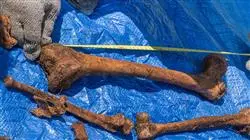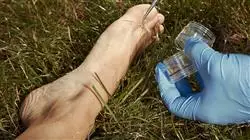University certificate
The world's largest faculty of nursing”
Introduction to the Program
Learn the latest advances in Forensic Thanatology for Nursing"

This Postgraduate certificate in Forensic Thanatology for Nursingontains the most complete and up-to-date scientific program on the market”
This Postgraduate certificate combines scientific application with the practical side, while at the same time adapting to new technologies with the implementation of online specialist training. It allows the student to learn the basic principles necessary for the study of forensic thanatology, forensic pathology, forensic sexology, forensic toxicology, forensic psychiatry, damage assessment, anthropology, and criminalistics.
The Postgraduate certificate meets the needs of professionals who demand adequate knowledge to enable them to carry out forensic assessments and expert reports, as well as the ability and fluency to ratify their opinion and understand the stages of the legal proceedings when necessary.
At the same time, it offers the possibility for all students to learn how to assess not only bodily injury, but also to quantify negligence, assess disability, and determine disabilities.
Currently, law firms and private clients require a forensic expert examination for most of their procedures. It is for this reason, in addition to the lack of existing professionals, that we consider it appropriate to implement a correct, up-to-date, and especially useful syllabus for the daily practice of this activity.
The Postgraduate certificateis divided into specific blocks that also coincide with the syllabus taught to those who wish to access Forensic Physician positions offered by the Ministry of Justice. This highlights the quality and scope of the content provided in the course.
With online training, students can organize their time and pace of learning, adapting it to their schedules, in addition to being able to access the contents from any computer or mobile device.
Improve your skills in Forensic Thanatology for Nursing through this program”
This Postgraduate certificate in Forensic Thanatology for Nursing contains the most complete and up-to-date scientific program on the market. The most important features of the program include:
- Development of more than 75 clinical cases presented by experts in Forensic Thanatology for Nursing
- The graphic, schematic, and eminently practical contents with which they are created provide scientific and practical information on the disciplines that are essential for professional practice
- Diagnostic-therapeutic innovations on evaluation, diagnosis and intervention in Forensic Thanatology for Nursing
- Practical exercises where the self-evaluation process can be carried out to improve learning
- An algorithm-based interactive learning system for decision-making in the clinical situations presented throughout the course
- With special emphasis on evidence-based medicine and research methodologies in Forensic Thanatology for Nursing
- All of this will be complemented by theoretical lessons, questions to the expert, debate forums on controversial topics, and individual reflection assignments
- Content that is accessible from any fixed or portable device with an Internet connection
This Postgraduate certificate may be the best investment you can make when choosing a refresher program for two reasons: in addition to updating your knowledge in Forensic Thanatology for Nursing, you will obtain a Postgraduate certificate from Forensic Thanatology for Nursing"
The teaching staff includes professionals from the field of Forensic Thanatology for Nursing, who bring their experience to this training program, as well as renowned specialists from leading scientific societies.
The multimedia content developed with the latest educational technology will provide the professional with situated and contextual learning, i.e., a simulated environment that will provide an immersive training program to train in real situations.
This program is designed around Problem Based Learning, whereby the medical must try to solve the different professional practice situations that arise throughout the course of the program. For this purpose, the physician will be assisted by an innovative interactive video system developed by renowned experts in the field of Forensic Thanatology for Nursing with extensive teaching experience.
Increase your decision-making confidence by updating your knowledge through this Postgraduate certificate"

Make the most of the opportunity to learn about the latest advances in Forensic Thanatology for Nursing and improve your patient care"
Why study at TECH?
TECH is the world’s largest online university. With an impressive catalog of more than 14,000 university programs available in 11 languages, it is positioned as a leader in employability, with a 99% job placement rate. In addition, it relies on an enormous faculty of more than 6,000 professors of the highest international renown.

Study at the world's largest online university and guarantee your professional success. The future starts at TECH”
The world’s best online university according to FORBES
The prestigious Forbes magazine, specialized in business and finance, has highlighted TECH as “the world's best online university” This is what they have recently stated in an article in their digital edition in which they echo the success story of this institution, “thanks to the academic offer it provides, the selection of its teaching staff, and an innovative learning method aimed at educating the professionals of the future”
A revolutionary study method, a cutting-edge faculty and a practical focus: the key to TECH's success.
The most complete study plans on the university scene
TECH offers the most complete study plans on the university scene, with syllabuses that cover fundamental concepts and, at the same time, the main scientific advances in their specific scientific areas. In addition, these programs are continuously being updated to guarantee students the academic vanguard and the most in-demand professional skills. In this way, the university's qualifications provide its graduates with a significant advantage to propel their careers to success.
TECH offers the most comprehensive and intensive study plans on the current university scene.
A world-class teaching staff
TECH's teaching staff is made up of more than 6,000 professors with the highest international recognition. Professors, researchers and top executives of multinational companies, including Isaiah Covington, performance coach of the Boston Celtics; Magda Romanska, principal investigator at Harvard MetaLAB; Ignacio Wistumba, chairman of the department of translational molecular pathology at MD Anderson Cancer Center; and D.W. Pine, creative director of TIME magazine, among others.
Internationally renowned experts, specialized in different branches of Health, Technology, Communication and Business, form part of the TECH faculty.
A unique learning method
TECH is the first university to use Relearning in all its programs. It is the best online learning methodology, accredited with international teaching quality certifications, provided by prestigious educational agencies. In addition, this disruptive educational model is complemented with the “Case Method”, thereby setting up a unique online teaching strategy. Innovative teaching resources are also implemented, including detailed videos, infographics and interactive summaries.
TECH combines Relearning and the Case Method in all its university programs to guarantee excellent theoretical and practical learning, studying whenever and wherever you want.
The world's largest online university
TECH is the world’s largest online university. We are the largest educational institution, with the best and widest online educational catalog, one hundred percent online and covering the vast majority of areas of knowledge. We offer a large selection of our own degrees and accredited online undergraduate and postgraduate degrees. In total, more than 14,000 university degrees, in eleven different languages, make us the largest educational largest in the world.
TECH has the world's most extensive catalog of academic and official programs, available in more than 11 languages.
Google Premier Partner
The American technology giant has awarded TECH the Google Google Premier Partner badge. This award, which is only available to 3% of the world's companies, highlights the efficient, flexible and tailored experience that this university provides to students. The recognition as a Google Premier Partner not only accredits the maximum rigor, performance and investment in TECH's digital infrastructures, but also places this university as one of the world's leading technology companies.
Google has positioned TECH in the top 3% of the world's most important technology companies by awarding it its Google Premier Partner badge.
The official online university of the NBA
TECH is the official online university of the NBA. Thanks to our agreement with the biggest league in basketball, we offer our students exclusive university programs, as well as a wide variety of educational resources focused on the business of the league and other areas of the sports industry. Each program is made up of a uniquely designed syllabus and features exceptional guest hosts: professionals with a distinguished sports background who will offer their expertise on the most relevant topics.
TECH has been selected by the NBA, the world's top basketball league, as its official online university.
The top-rated university by its students
Students have positioned TECH as the world's top-rated university on the main review websites, with a highest rating of 4.9 out of 5, obtained from more than 1,000 reviews. These results consolidate TECH as the benchmark university institution at an international level, reflecting the excellence and positive impact of its educational model.” reflecting the excellence and positive impact of its educational model.”
TECH is the world’s top-rated university by its students.
Leaders in employability
TECH has managed to become the leading university in employability. 99% of its students obtain jobs in the academic field they have studied, within one year of completing any of the university's programs. A similar number achieve immediate career enhancement. All this thanks to a study methodology that bases its effectiveness on the acquisition of practical skills, which are absolutely necessary for professional development.
99% of TECH graduates find a job within a year of completing their studies.
Postgraduate Certificate in Forensic Thanatology for Nursing
Professionals belonging to the medical area of Nursing are constantly seeking to update their knowledge in order to incorporate new skills and competencies to their careers. Due to this motivation in TECH Global University we developed a Postgraduate Certificate in Forensic Thanatology for Nursing, a high academic level program specialized in new areas that will help you maximize your skills and become an expert in legal nursing. This will allow you to determine the causality of the deaths and to know indications of guilt that indicate details of the events that occurred. In addition, you will delve into topics such as the degrees of death, saponification and/or mummification and the preserving and transforming phenomena of the corpse. Renew your knowledge in the largest Nursing School and achieve professional success.
Get certified in Thanatology and Legal Nursing.
At TECH we have the most innovative educational methodology in the sector; we designed a program with academic excellence specialized in covering all the required fields of this area to improve your employability opportunities by 99%. This is why, in addition to learning about forensic pathology and its derivatives, you will learn about sexology, toxicology, psychiatry, anthropology and criminology. In this way, you will be an expert in making forensic assessments and expert opinions and/or reports in a fully qualified manner. You will also deepen in the evaluation of bodily injury, the assessment of disabilities and the determination of disabilities.
Take a Postgraduate Certificate 100% online
Throughout 200 hours you will be able to update your knowledge and incorporate new skills to your professional profile. You will be an expert in criminal judicial autopsy, civil judicial autopsy, vital, perimortal and post-vital injuries, as well as auxiliary techniques for forensic medical necrodiagnosis. At TECH we provide you with the latest techniques and tools to make your education unstoppable; we have a team of high level teachers who will guide your learning process at all times. Additionally, you will be able to carry out case studies that will help you perfect your methods, highlight your professional profile and add new skills to perform your work correctly. Take this program online and coordinate your study time as it best suits you.







